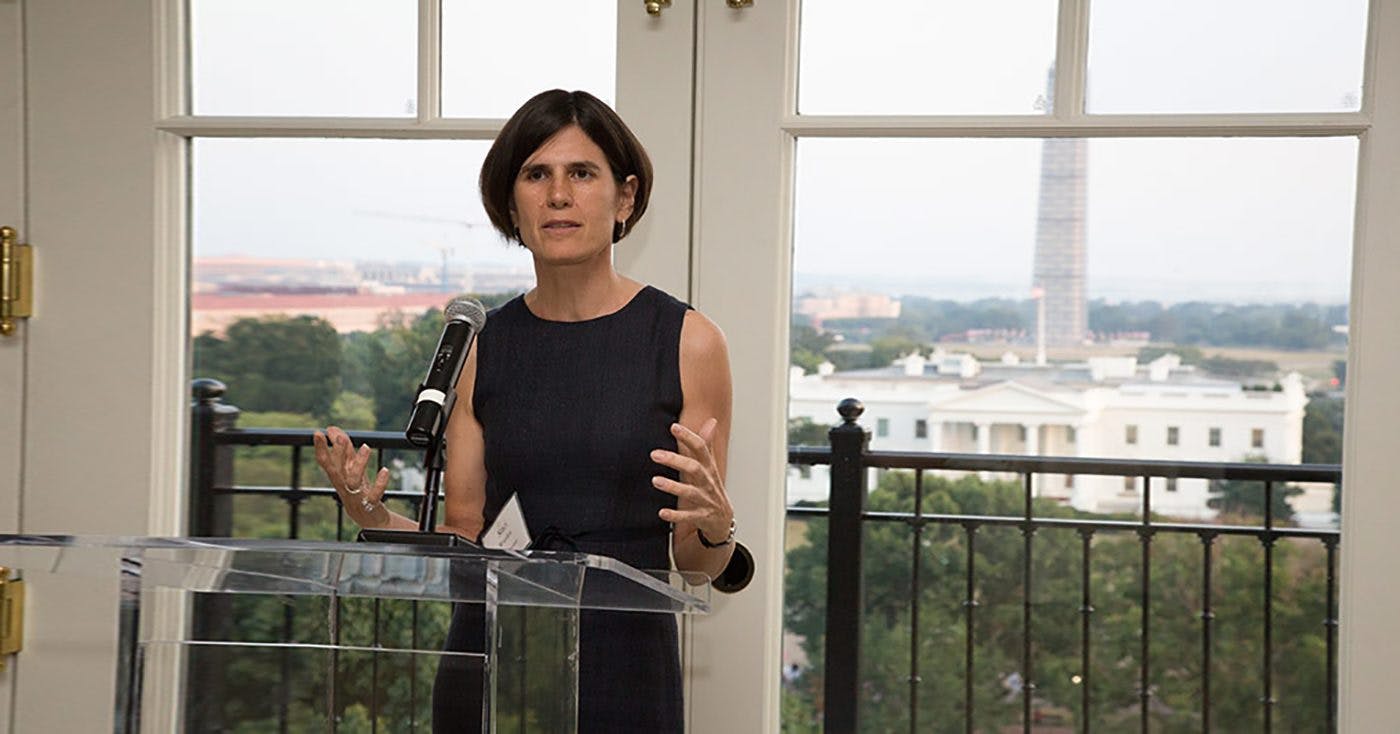Former JPMorgan Exec Named Algorand Foundation CEO
Staci Warden also brings experience from roles at the Milken Institute, Nasdaq and the US Treasury Department

Staci Warden; Source: Milken Institute
- New CEO has spent much of career focused on capital market development and financial inclusion, particularly within developing countries
- Warden is focused on bolstering Algorand’s marketing efforts and building up its ecosystem in 2022
Staci Warden has worked in the public sector, the private sector and at a non-profit organization. Now she is joining the Algorand Foundation as its CEO.
By leveraging the Algorand protocol and open-source software, the Algorand Foundation seeks to create an open, public and permissionless blockchain.
Warden joined the Algorand Foundation board in September. She will replace Sean Lee, who spent the last 18 months as CEO and is exploring career opportunities outside the organization.
Getting into crypto
Warden first dabbled in crypto during her time at the Milken Institute, where she ran the organization’s global market development practice.
She was tasked with being a resource for financial education to the press while working at the non-profit, and in 2013, people became curious about bitcoin.
Warden made it her mission to better understand the digital asset and the technology behind it, she told Blockworks, listening to industry pioneers such as Gavin Andresen and Brock Pierce in her spare time.
“I thought it was really the most amazing thing that I had ever come across,” she said.
“The idea of the proof-of-work behind bitcoin and the idea that in a trustless environment you could have a well-functioning monetary supply dynamic, I thought was really incredible.”
She would later discover Ethereum and the idea of programmable money with no intermediaries.
“For me, I think it hit particularly hard because I had such a deep experience in developing countries and emerging markets where financial intermediaries don’t function very well and where they can be really rent-seeking to people that are just trying to save money, invest it properly and make their lives better,” Warden explained.
Through a range of roles throughout her career, Warden has focused on capital market development and financial inclusion, particularly within developing countries.
Before working at the Milken Institute from 2013 to 2021, she was an executive director at JPMorgan for eight years. There, she led the company’s public sector division in Europe, the Middle East and Africa, focused on improving capital markets in emerging markets.
Prior to JPMorgan, she worked at the US Treasury Department as an international economist and then at Nasdaq, where she led its two markets for micro-cap companies.
After learning about crypto while at the Milken Institute, Warden wrote about crypto and blockchain for the organization’s publication.
“Fundamentally, it is potentially the answer for financial inclusion, and that’s very important for me,” she said of the industry.
“When you’re at a think tank…you’re not exactly playing the game; you’re more observing and more trying to shape the game, and I guess I decided I wanted to be on the field.”
Outlook for Algorand
With an estimated 1.7 billion people globally that do not have access to finance, Warden argued the Algorand protocol is best equipped, with its speed, security and decentralization, to address that problem at scale.
“Staci understands the potential for Algorand to become a dominant layer-1 blockchain, and she has the experience and expertise to drive our global efforts to scale and to deliver outstanding value to our community,” Algorand Foundation Board Chairman Kieron Guilfoyle said in a statement. “I know she will waste no time in shifting the Algorand Foundation into its expansion phase.”
Warden noted that transaction fees are 0.001 ALGO and the blockchain processes at 1,000 transactions per second.
The current market capitalization of Algorand’s native currency ALGO is nearly $7 billion, according to CoinGecko, making it the 25th largest, ahead of Bitcoin Cash (BCH).
Competing blockchain Solana is processing more than 2,000 transactions per second at a cost of $0.00025 per transaction, according to the blockchain’s website.
Algorand and Solana have become a few of the range of layer-1 alternatives to Ethereum, which has speeds closer to 15 transactions per second and higher costs. An upgrade to the network, expected in a few months, includes a shift from the proof-of-work consensus mechanism to proof-of-stake, and a further upgrade later this year is planned to scale its capacity to 100,000 transactions per second through a method called sharding.
“I think I have the best product, and the product is not well understood and not well appreciated and not well known,” Warden said.
She intends for the Algorand foundation to put more resources into marketing and communications by quadrupling the size of its community engagement team and expanding its developer relations unit.
In addition, building up the Algorand ecosystem as the growth of crypto payment platforms, DeFi and NFTs accelerates will be crucial, Warden said. This includes ensuring Algorand is in wallets, offered by custody providers and a part of bridges and oracles.
“We absolutely need to focus on that and draw liquidity and draw the best developers and draw the smartest entrepreneurs to the Algorand ecosystem and our layer-1 so that we can help them build up this ecosystem,” she added. “In the longer-term, it’s going to be a real-world play, making sure that we are the layer-1 that wallets use for real-world payments.”
Get the news in your inbox. Explore Blockworks newsletters:
- The Breakdown: Decoding crypto and the markets. Daily.
- 0xResearch: Alpha in your inbox. Think like an analyst.






